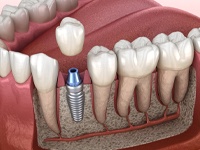
Dental Implants – Dallas, TX
Lifelike Tooth Replacement That Lasts
Do you avoid eating certain foods or saying certain words because your missing teeth make these tasks difficult? Do you try not to smile or laugh in front of others because you’re self-conscious about the gaps in your grin? Thanks to dental implants, you don’t have to deal with the problems of tooth loss any longer. Instead of simply sitting on top of the gums, dental implants in Dallas recreate every part of a missing tooth. The end result is a solution that feels as natural as it looks. Plus, it can last for 30+ years! If you’re ready to enjoy having a complete smile again, contact our team at Midtown Family Dentistry of Dallas to learn more about dental implants.

Why Choose Midtown Family Dentistry of Dallas for Dental Implants?
- Partnered with the Best Oral Surgeons in Dallas
- Evening & Weekend Dental Appointments Available
- Flexible Financing Options to Make Your Dental Care Affordable
What Are Dental Implants?

While traditional tooth replacements like dentures and dental bridges merely rest on the gums, dental implants take it one step further by also replicating the root structure of the teeth. The implant itself is a small, screw-shaped post made from biocompatible materials, usually titanium. Once the implant is surgically placed in the jaw, it actually encourages the bone to grow around it, forging a bond as strong as that of a natural tooth. From there, it can support a customized dental crown, bridge, or denture to bring back any number of missing teeth with a solution that’s virtually indistinguishable from the real thing!
The 4-Step Dental Implant Process

Unlike dentures or bridges, the method for getting dental implants requires a unique, multi-step process that spans several months. Although this might seem like a major commitment, the long-term benefits are well worth the time and effort invested! We’re proudly partnered with some of the best oral surgeons in the area, so you can rest assured that you’re receiving an exceptional level of care. Though every patient’s treatment plan is different, there are usually four main steps you can expect: consultation, surgery, osseointegration, and the delivery of the final restoration. Keep reading below to learn more about these steps!
Initial Dental Implant Consultation

The first step towards reconstructing your smile is to attend your dental implant consultation; during this appointment, our team will closely examine your mouth and facial structures to determine your candidacy for dental implants. In some cases, patients may need to undergo preliminary procedures including but not limited to supplemental bone grafting, gum disease therapy, tooth extractions, and more. However, once these procedures are taken care of, we can set things in motion and schedule your dental implant surgery.
Dental Implant Surgery

The actual implant placement surgery is a fairly straightforward procedure. Our practice is thrilled to be partnered with some of the best oral surgeons in the Dallas area, meaning that your smile is in good hands. Your mouth is numbed, and small incisions are made in your gum tissue to access your jawbone. The implants are inserted at precisely calculated locations and angles, and then your gums are sutured shut. To help maintain the shape of your gums and protect your implants throughout the healing process, a protective cap is also placed over them.
Dental Implant Osseointegration & Abutment

You’ll spend the next three to six months waiting for your implants to naturally fuse with your jawbone. This process, called osseointegration, is arguably the most important stage of the whole process—if your implants cannot successfully fuse with your jawbone, they will ultimately fail! But once this stage is complete, you’ll still need to return for a second, smaller surgery to receive your abutments. These metal connector pieces are positioned on top of your implants and allow your personalized crown, bridge, or denture to sit in place.
Delivery of Dental Implant Restorations

Your restorations/replacement teeth will be designed based on impressions of your smile, meaning that once they’re complete, you can expect them to wholly resemble your natural teeth. When they’re ready, they’ll be attached to your abutments where they can begin to restore your smile in terms of look, feel, and functionality! We’ll check to make sure that your bite is comfortable and that everything looks normal before sending you out into the world with your newly rebuilt smile.
Benefits of Dental Implants

By replacing the roots of the teeth in addition to the crowns, dental implants can accomplish things that conventional options simply cannot. Not only do you gain a major confidence boost from having a full set of pearly whites again, but you also enjoy incredibly lifelike tooth replacement that lasts. When you replace your lost teeth with dental implants, you can look forward to several benefits in your day-to-day life and your health for years or decades to come.
Day-to-Day Benefits

- Full diet – Because your new teeth will be firmly rooted in your jawbone, you won’t need to worry about them slipping out of place while you eat. Plus, they restore much more chewing force than dentures and bridges alone, making it a breeze to enjoy practically everything on your plate.
- Confidence – Your prosthetic teeth will be carefully designed to mimic your natural smile and complement your overall facial features. No one outside of our dental team should even have to know that your teeth were ever replaced.
- Easy maintenance – Cleaning dentures can be notoriously frustrating and time-consuming, but it’s the exact opposite with dental implants. For the most part, you can brush and floss them exactly as you would natural teeth.
Health Benefits

- Jawbone support – The jawbone naturally begins to shrink after a tooth has been lost, but dental implants support the bone from the inside. This keeps your jawbone healthy enough to maintain its original strength and shape.
- Protection for natural teeth – To place a dental bridge, our dentists would have to shave some enamel off of two of your remaining teeth, which may leave them weaker over time. A dental implant, on the other hand, can support itself, meaning we don’t need to alter healthy tooth structure.
- Improved systemic health – Some research has suggested that the more natural teeth a person is missing, the higher their risk for various medical conditions, including heart disease. Since dental implants fulfill every function of natural teeth, it’s reasonable to assume that they prevent an increase in such risks.
Long-Term Benefits

- Highly successful treatment – The success rate of dental implant placement is as high as 95%. This means the risk of your implant needing to be removed or replaced is slim to none.
- Lasting results – On average, dental implants can last for 30+ years, and many patients go on to enjoy their implants for the rest of their lives.
- Saved money and time – While implants may not be the cheapest option upfront, they’re the most cost-effective tooth replacement in the long run. With their long lifespans, they’ll save you the expense of replacing a denture or bridge every few years. You also won’t need to purchase denture adhesives or special cleaning products, which can add up significantly over time.
Who Dental Implants Can Help

Are you wondering whether dental implants are right for you? While the only definitive way to find out is to schedule a consultation with a dental implant dentist in Dallas, most generally healthy adults qualify for this treatment. Depending on how many teeth you need to replace, we can use one of the following options to help rebuild your smile.
Who Is a Good Candidate for Dental Implants?

As mentioned above, virtually all healthy adults can be eligible for dental implants. However, there are three particular factors our team will need to consider so that we can accurately determine the success of the treatment. These include:
- Great Oral Health: You’ll need to be completely free of any underlying complications in your mouth, such as decay and gum disease, otherwise your dental implants could end up failing. We’ll be sure to address these before moving forward with the procedure.
- Good Overall Health: Since dental implants involve minor oral surgery, you’ll need to be sufficiently healthy for proper recovery.
- Ample Jawbone Density: For your dental implants to be successful, they’ll need to be able to fuse with your jawbone via osseointegration, that way your restoration(s) can have a lifelike and stable foundation.
Even if you don’t currently meet these requirements, our team will be glad to help prepare your mouth for the procedure. We might perform treatments like periodontal therapy, bone grafting, or even tooth extractions beforehand. Once you’ve recovered and your mouth is in great shape, we can move forward with dental implants.
Missing One Tooth

A single dental implant can be placed vertically between two remaining teeth without altering them in the slightest. This implant is then topped with a personalized crown for seamless results. Unlike a dental bridge, you won’t have to sacrifice healthy tooth structure to fill the gap.
Missing Multiple Teeth

To replace three or more missing teeth in a row, an implant can be inserted at either end of the empty space to support a dental bridge that is much sturdier and longer-lasting than traditional bridges. For several missing teeth that are located throughout the mouth, a few expertly placed implants can anchor a partial denture.
Missing All Teeth

In most cases, four to eight implants are all that is needed to replace an entire arch of lost teeth with a full denture. While regular dentures often slide around and lead to embarrassment and discomfort, implant dentures remain firmly in place. They allow you to enjoy a varied diet and smile confidently with a solution that can last several times longer than a conventional prosthetic.
Dental Implant Failure & Salvage

Do you suspect you have a failed dental implant in Dallas? Although this method of tooth replacement has an impressive success rate of more than 95%, there are still rare instances where failure can occur because of infection, trauma, or other circumstances. If your implant ever feels loose or uncomfortable, your smile could be in danger. Don’t hesitate to give us a call and let us know what’s going on – we’ll do our best to preserve your implants and protect your oral health!
Learn More About Dental Implant Failure & Salvage
Understanding the Cost of Dental Implants

At Midtown Family Dentistry of Dallas, we don’t believe in cookie-cutter treatments. As a result, it can be difficult to estimate the general cost of dental implants. We take the time to consider each case and a patient’s specific needs to formulate an optimal plan.
During your consultation, we’ll provide you with an estimate based on our dentist’s recommendation. If you’d like to learn more about what to expect with the cost of dental implants in Dallas, continue reading or give our team a call today!
Preliminary Treatments & Dental Implant Surgery

If you have existing oral health problems, you'll likely need preliminary treatments before moving forward with the dental implant process. Even though services like gum disease therapy, tooth extractions, and bone grafting will add to the overall cost of your treatment, depending on your case they can be necessary to maximize the lifespan of your new smile. Fortunately, most of them are partially covered by dental insurance.
Keep in mind that dental implant surgery has a cost of its own. We are partnered with the best oral surgeons in Dallas, so you can rest assured that you are investing in what will be a quality result for your smile.
The Parts of Your Dental Implant

When it comes to dental implants in Dallas, the cost is affected by multiple factors including:
- Material – Implants made of zirconia instead of titanium typically cost less.
- Brand – Manufacturers make dental implants differently based on the needs of each patient. Be sure to ask your implant dentist in Dallas where you’re getting yours from as well as any brand-specific benefits.
- Number of Dental Implants – Obviously, replacing a single missing tooth with one dental implant will cost less than replacing an entire row with an implant denture.
- Type of Restoration – Crowns, bridges, and dentures each cost different amounts. Expense corresponds to the size of the restoration.
How Dental Implants Can Save You Money

Patients on a budget often choose dentures or dental bridges as their method of tooth replacement because they’re cost-effective. Even though dental implants have a higher upfront cost, they end up paying for themselves over time. For example, you won’t need to pay for replacements or adjustments every few years.
You also don’t have to worry about purchasing special pastes, solutions, or other products to maintain your rebuilt grin. All you must do is care for your implants like you would for your natural teeth! Since they’re easier to maintain, you can more easily avoid oral health issues that would require costly dental treatment.
Does My Dental Insurance Cover Dental Implants?

Most dental insurance plans do not offer coverage for dental implants. However, there are some exceptions. Certain parts of the final restoration or your preliminary treatments might be eligible for coverage. Before committing to anything, contact your insurance provider to confirm the details of your coverage. Our team is happy to help with that step if needed!
Making Dental Implants Affordable

Don’t have dental insurance? No problem! We work with third-party financiers to help make your dental bills much easier to manage. With CareCredit and Sunbit, you can sign up for low-to-no interest payment plans to break up the overall cost of your treatment into smaller monthly installments. Also, consider our membership plan, which provides you with a 20 percent discount on all non-orthodontic treatments!
Maintaining & Caring for Your Dental Implants

Once the dental implant process is complete, our team can give you tips for taking care of your new smile. You’ll notice that dental implant maintenance isn’t much different from what you would normally do to protect your natural teeth. This makes giving your implants the care they need a relatively simple matter. Here are a few steps that our team recommends following if you want your dental implants to last for the rest of your life.
Make Oral Hygiene a Priority

You need to give your dental implants the same attention as the rest of your smile when brushing and flossing. Any harmful bacteria that are allowed to accumulate around your new teeth could contribute to gum disease, which can eventually compromise the dental implant posts. It’s therefore imperative to keep the area around your dental implants clean. To that end, it’s often a good idea to start rinsing with mouthwash that has been approved by the American Dental Association.
Eat a Healthy Diet

Eating the occasional piece of cake or enjoying some potato chips every once in a while won’t lead to major problems with your dental implants. But if you eat nothing but sugary and starchy foods, you’ll be more likely to suffer from gum disease – and thus, more likely to experience dental implant failure. Take care of your smile by eating a balanced diet that includes plenty of calcium and Vitamin C.
Break Bad Habits

Sometimes it’s the little things that can put your dental implants at risk. Biting your fingernails, chewing on the end of your pen, smoking, crunching ice, and using your teeth as tools to open packages are all examples of habits that can damage the implant posts. Protecting your dental implants means identifying these habits and taking the initiative in breaking them before they start to cause problems. One trick is to find safer habits, such as chewing sugarless gum.
Protect Your Dental Implants

A sudden blow to the mouth when playing sports could potentially cause your dental implants to break. If you regularly engage in any kind of high-contact physical activity, take the appropriate precautions by wearing a mouthguard.
It’s also important to be aware if you’re suffering from bruxism. This is a condition where you frequently clench or grind your teeth, typically at night when you can’t control what your jaw does. Prolonged bruxism can damage your dental implants; fortunately, keeping your smile safe is often as simple as wearing a nightguard.
Schedule Regular Dental Checkups

If you’re already visiting your dentist every six months for a checkup and cleaning, it’s probably no surprise to learn that these appointments are just as important for protecting your dental implants. Any problems that might be developing around the implant posts can be treated long before they turn into complex problems that potentially take a lot of time and money to address.
Dental Implant FAQs

Dental implants are a lifechanging tooth replacement option, but you want to be well informed before committing to the procedure. Here are the answers to some of the most common dental implant queries we receive. If you don’t see the information that you’re looking for below, give us a call! We’d be more than happy to answer your questions and get you started with an initial consultation.
How Long Do Dental Implants Last?
The lifespan of dental implants depends on the health and lifestyle choices of the patient. To ensure that dental implants last, it is important to brush twice, floss, and rinse with a mouthwash on a daily basis. Attend regular cleanings and checkups and avoid munching on anything particularly hard or sticky. With proper maintenance, dental implants can last upwards of 30 years! This is several times longer than the average traditional bridges and dentures.
Does Getting Dental Implants Hurt?
Your jaw doesn’t have many nerve endings, and your mouth will be numbed with a local anesthetic before the procedure starts. You will also most likely be sedated, lowering your body’s ability to register pain. Even though the surgery won’t be painful, your mouth may be sore for a few days following it. Take recommended over-the-counter and prescribed medication as directed. Cold compresses have also shown to help. Give us a call if discomfort worsens instead of improving after two to three days.
Will I Have to Take Off Work for Dental Implant Surgery?
Most patients only need to take off one to two days in order to get dental implants, but everyone is different. If you have a job that is physically demanding, you may want to take off three to four days, as heavy exercise can divert blood from the implant site and slow down the healing process. During your consultation, we will be able to give you a more specific recommendation for your unique case.
Will People Be Able to Tell That I Have Dental Implants?
Impressions will be taken of your mouth to be used to design your personalized restorations. As soon as your restorations are placed, no one should be able to differentiate them from your natural teeth. Implants are placed in the jaw like your natural tooth roots. You won’t need to hold your jaw in a specific way to hold them in place. Instead, they are anchored in their permanent locations.
How Long Have Dental Implants Been Around?
The oldest evidence of dental implants dates back to around 600 A.D. Archaeologists discovered ancient Mayan skulls with pieces of seashells and carved stones replacing missing teeth – some had even fused with the jawbone!
In 1952, a Swedish orthopedic surgeon discovered that he couldn’t remove a small titanium cylinder he placed in a bone to study the bone healing process. Because titanium could fuse with the jawbone, it then became the gold standard for dental implants. Modern dental implants have been around since the 1970s, and they are very reliable and precise.
How Soon After a Tooth Extraction Can I Get Dental Implants?
In some cases, if the jawbone is healthy enough, a dental implant can be placed right away. However, dentists often recommend waiting three to six months for the mouth to completely heal. Waiting too long can cause the jawbone to shrink due to the lack of stimulation from the tooth’s roots. Ultimately, this will depend on each individual case, so you should discuss it with your dentist.
Do Dental Implants Decay?
No – dental implants are not made of tooth enamel, so they cannot get cavities. However, your remaining natural teeth still can, and your gums can still become infected. That’s why it is still super important for you to maintain an excellent dental hygiene routine. This includes brushing twice, flossing, and rinsing with mouthwash every day.
How Long Does Dental Implant Surgery Take?
This will depend on the number of dental implants you are having placed. Generally, replacing a single dental implant takes between one and two hours. This includes the time needed to administer anesthesia and prepare you for a sterile surgical atmosphere. Your dentist can give you a more specific estimate so you know exactly what you can expect.
I Need a Checkup & Cleaning I am Looking for a Dentist for My Child I am Concerned About Bleeding Gums I Have a Cavity or Broken Tooth I am Missing One or More Teeth I am Unhappy with My Smile I Want a Straighter Smile I am Afraid/Nervous of the Dentist I am in Pain & Need Help I Need My Wisdom Teeth Removed View Our Services